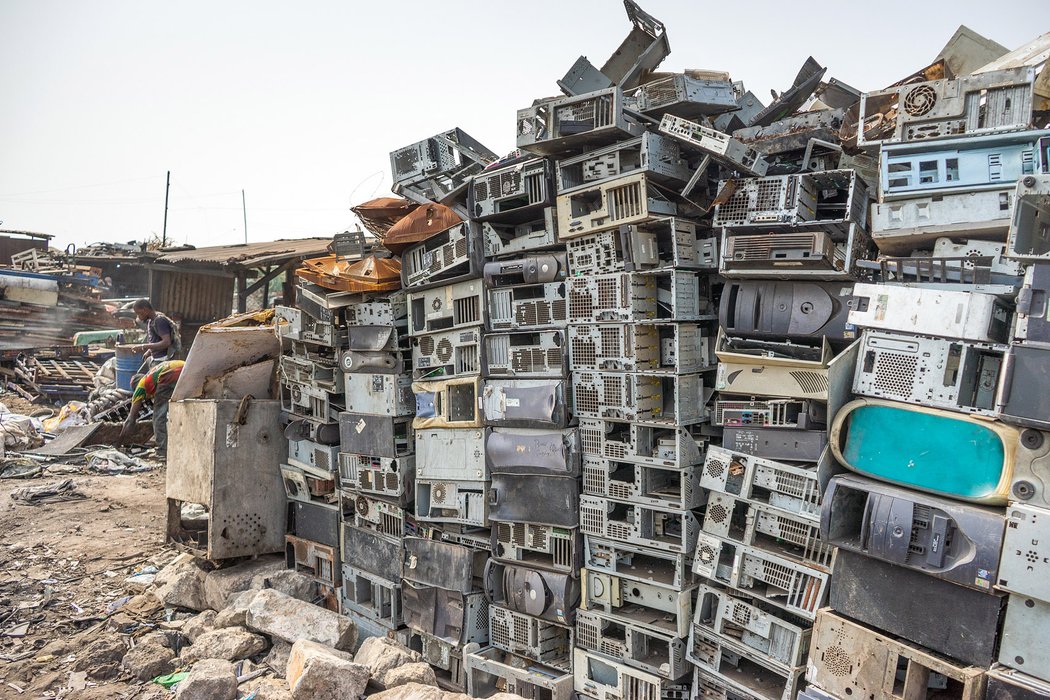The E-Waste Mega Dump of Agbogbloshie
You are such a conscientious citizen of the world! You wouldn’t dump that old computer in the bin. Heaven forbid! There’s the ecological future of our glorious planet to think of, let alone your privacy! You’re happy to drive ten miles to the nearest “e-waste” point! You’ll go home, confident that you’ve done the right thing. It’s nice to stop thinking about things once they’re out of your hands… but although we hate to bust your bubble, we think you should know. Right now, your computer is in Agbogbloshie, Ghana. It’s definitely not being deconstructed in an ecologically-sound manner. And it’s probably being hacked into.

We learned a lot about the Western scam of “recycling” while we were in Ghana. All those old shirts you’ve so thoughtfully given to a charity? They’re in a dump in Ghana. All the plastic waste you so carefully separate from the paper waste? It’s in a dump in Ghana. And your computers, tablets, phones, and other assorted electronics? They’re in Ghana. In the best case, they’re being burned by children, the thick black clouds poisoning surrounding communities and melted metals running into the ground water. Worst case, they’re being hacked into, and mined for data. And then being burned.
It’s an absolute scandal, and one that nobody wants to recognize as even existing. It’s not nice to think about, and all the powerful players get to profit under the current system. Europe and America win by having somewhere to ship off their junk, and wipe their hands clean, pretending that they’ve done their part. Ghana’s government wins by gobbling up those juicy foreign contracts. But it’s a fact. If you dump your computer in a legitimate “safe” location, it’s entirely possible that it will end up at Agbogbloshie, in an unbelievable collection of other properly-disposed-of junk. Don’t kid yourself.
Ghanaians are enterprising, and they’ve come to understand the secret value of the treasure being deposited at their doorstep. So, they’ve taught themselves to recover data from busted hard drives. They know how to get sensitive information, and what to do with it. Scams originating from Agbogbloshie are so prevalent, that they’ve given rise to a new culture: the Sakawa Boys. These guys mine data, steal identities, impersonate lovers… and have become the feted robber barons of the country. As easy as it is to demonize their actions, it’s equally easy to understand the popular appeal of enterprising young Africans stealing from those who dump trash in their country.

Our visit to Agbogbloshie was insane. This is not on the regular tourism itinerary, and we can only beg that you discard the idea of going yourself, or ensure that you know exactly what you’re doing and use extreme caution. Know a local who can get you in. Bring cash for bribes. Do not just start taking pictures willy-nilly. The Sakawa Boys are not messing around, and they don’t exactly love the idea of foreigners trespassing on their territory.
Agbogbloshie is an immense mountain of electronic junk, unlike anything we’ve ever seen. We got as close as possible with our car, then started walking toward it … and almost immediately, we found trouble. Jürgen, sweet Jürgen, who absolutely cannot control himself in a situation like this, despite understanding the danger, had started photographing a bunch of guys melting cables. And these guys were displeased. Terror arose in my lungs as they approached, and started demanding answers. Luckily, our guide was able to talk them down (with the help of a little money), and we were permitted to continue. Our guide pleaded with us to not take any more pictures without explicit consent; the men who had confronted us weren’t just regular locals, but part of an organized mafia … as deadly serious as any in Sicily.
And now that we knew there was a system, even a hierarchy, the activity at the trash mountain started to make sense. There were people whose “job” was apparently to fish out phones. Others in charge of finding wires and cables. Others who went for laptops, and still others for motors. These treasures would be hauled off … some to be mined, others to be burnt. It’s unclear who “pays” the people to melt the trash (if anyone), but we could just imagine what happens with the laptops — some of which seemed to be in perfect condition.
Our bribe to the cable-burners had been sufficient that they allowed us to take more pictures, and even fly our drone over the immediate area. And the true, nauseating reality came to life from the air. We could see a river of plastic trash — literally, something that used to be a river, now reduced to an immobile collection of plastic bottles. We could see the various piles of noxious electronics burning, polluting the air with thick, black smoke. (Our own apartment, not far away, was heavily affected by this pollution. Every day, we mopped our front steps, horrified by how much black soot had accumulated, and wondering how much we had already inhaled.)
From our Ghana Travel Blog!









































